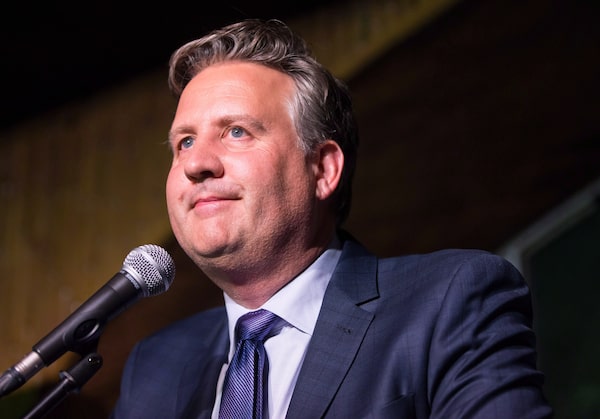
Vancouver Mayor Kennedy Stewart stepped up pressure to tackle systemic racism within the city’s police force, saying the Calgary force has made significant moves to address the issue and it is Vancouver’s turn.DARRYL DYCK/The Canadian Press
Vancouver Mayor Kennedy Stewart stepped up pressure to tackle systemic racism within the city’s police force Wednesday, saying the failure to do so has hurt people.
In the latest in what has become a year-long debate between the Mayor and police, Mr. Stewart said the Calgary force has made significant moves to address the issue and it is Vancouver’s turn.
“Systemic racism exists in all our institutions. It is not an attack on individual employees,” the Mayor said as he quoted from the Calgary Police Service’s September, 2020, report on commitments to anti-racism, equity and inclusion. “The Vancouver Police Board has not reached even this point.”
The Mayor noted he has become the subject of a recent complaint letter to the police board about previous statements on the matter. That letter has not been made public by the board, but the Vancouver Sun reported it is from a sergeant who is a police union leader, saying the Mayor has created a toxic work environment and led to increased assaults on officers.
The Mayor didn’t address the issues in the complaint but said, “I will not allow anyone to silence me.”
He said he can’t push the board to take action, even though he is the chair, because the rules governing B.C. police boards say the chair can’t vote or introduce motions.
A police representative and at least one city councillor said it doesn’t help to have the Mayor fostering division instead of collaborative work.
“It’s the work of public servants today to recognize and work to reduce and eliminate the harm caused by racism. However, that work is held back when there is a lack of trust or outright blame between the leaders with the greatest influence,” independent Councillor Rebecca Bligh said.
Tom Stamatakis, a former Vancouver police union president and now president of the Canadian Police Association, said the Mayor seems to be more focused on “virtue-signalling rhetoric” than working co-operatively with police to improve practices.
“It’s divisive, people get distracted. You have your Mayor making broad statements to suggest this is a widespread issue. It has an effect.”
Mr. Stamatakis said he’s seen a lot of tension between mayors and police chiefs over budgets and other issues, but nothing like the Vancouver Mayor’s persistent criticisms.
Mr. Stewart has been talking about problems with systemic racism – with police, city hall and all colonial institutions – since last June, in the wake of massive international protests over the police killing of a Black man, George Floyd, in Minneapolis.
Police Chief Adam Palmer has maintained that his department, like any large employer, might have people in it who hold racist views, but it’s not a systemic problem.
Police in Vancouver, along with many other cities, have been on the defensive for at least the past year, as activist movements have lobbied to have police budgets reduced and redirected to social services. Vancouver’s police budget wasn’t decreased, but it did not rise to match inflation – which Chief Palmer said would mean reduced services.
As well, there’s been a move among some school boards to get rid of police liaison officers at high schools. Vancouver and nearby New Westminster have voted in support of that.
Prior to the wave of protests connected to Black Lives Matter, Vancouver’s force, along with some others in British Columbia, had come under fire for street checks that were disproportionately done on Indigenous, Black and Middle Eastern people. The Mayor was also vocal about the need for changes in that practice.
Calgary police Chief Mark Neufeld has been unabashed in talking about systemic racism among police.
Last June, he had an opinion piece published in the Calgary Herald that acknowledged his own change in attitude.
“Had you asked me a few weeks ago whether systemic racism was a problem in Calgary and in the Calgary Police Service, I may have said no,” he wrote. “But after weeks of hearing many stories, some very painful, about the prevalence of racism in our city and the experiences of people of colour, it’s clear there is much more work to be done.”
The police service’s September, 2020, report said: “We are setting out to dismantle systemic racism that has existed within our service since its inception. This requires significant long-term effort, with many contributors at the table.”
Vancouver police are often viewed by other forces as relatively progressive, because of their support for city policies related to supervised drug-injection sites and sex work and their efforts to create a diverse police force. The force is about 30-per-cent people of colour and has numerous requirements for cultural sensitivity training.
Last June, the board responded by committing to a number of new actions, including “historical awareness and cultural sensitivity training for current and future officers regarding the experiences of Black people in Vancouver and Canada.”
We have a weekly Western Canada newsletter written by our B.C. and Alberta bureau chiefs, providing a comprehensive package of the news you need to know about the region and its place in the issues facing Canada. Sign up today.
 Frances Bula
Frances Bula